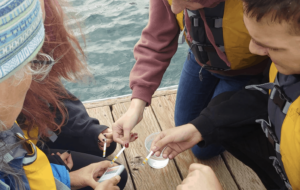Smart Cities: San Diego

Running the San Diego County Office of Education seems pretty tame after tours of duty as state administrator in Oakland and Compton, but Randy Ward argues that county offices are more relevant than ever. With half a million kids and 42 districts there’s plenty to worry about.
County offices (ESD in WA, RESD in MI, BOCES in NY) have an interesting mixture of administrative oversight, supporting and convening, and entrepreneurial fee-based services. County CTO Stephen Clemons says the county provides payroll services for 55,000 employees in 40 districts and runs a big data center. A few of the other SDCOE initiatives include:
- Achievement Gap Taskforce is hosting a principals forum on March 14.
- Friendship School serves medically fragile students with an award winning Assistive Technology and Sensory Integration Program that supports students with severe learning disabilities.
- A pilot program to serve Juvenile Court students through synchronous and asynchronous learning models (launching in September under CA AB 644).
- Supporting Leading Edge Certification, a professional development program developed by an alliance of county offices of education, universities, and nonprofits focused on educational technology and curriculum innovation. A small cohort of educators is led by Dr. Greg Ottinger, Director of Blended and Online Learning (it’s cool that a county has a blended learning director).
- The San Diego Science Alliance High Tech Fair for grades 6-12 was held two weeks ago.
With more than 100 charter schools, San Diego County wins a B- on the Brookings Education Choice and Competition Index, the same category as Houston, Dade, Milwaukee, and Baltimore.
Innovative Districts. A decade ago many of us pointed to San Diego as a potential proofpoint–a district driving aggressive improvement and embracing options. Serving 132,000 students (nearly half hispanic) in 223 schools, the district has hired and fired some talented superintendents and seems adrift in debt and one year fixes. Recently they used bond funding to buy 25,000 iPads—well intentioned, just not well planned. In the most interesting and candid interview with a school district employee ever, the district’s new CFO exposes waste, excess, and claims the board is “Placed, strategically, by the labor unions.” The superintendent issued corrections. Hard to believe the guy is still employed.
On the other hand, there are medium-sized districts like San Marcos Unified School District narrowing the achievement gap with thoughtful planning of their 1:1 deployments. Chula Vista Elementary School District is another example of sustained and thoughtful leadership with pretty good results.
Cool Schools. Headlining everyone’s cool school list is High Tech High. I met Larry Rosenstock in a trailer outside a gutted warehouse on an abandoned Naval base almost 13 years ago and quickly sensed that he had a vision and experience to create a remarkable school. Today the network includes 11 schools and a Graduate School of Education. If you want to see a place where students do interesting work (like the San Diego Bay Study) and show what they know, start with the MIT of high schools and visit High Tech High. It’s also the best art school in the country.
A new school is opening in two floors of the spectacular new San Diego Public Library in September; e3 Civic High is a problem-based school focus on global workplace readiness and providing a variety of work and community connections.
Dr. Ward says Riverview Elementary in the Lakeside Union School District is worth seeing. It’s a world languages school featuring Spanish and Mandarin with additional emphasis on digital literacy.
Health Sciences Middle College High School partners with healthcare providers to provide job shadows, internships, and application opportunities. Students benefit from a blended model and take college credit courses.
Classical Academy, two K-8s that feed a high school, focus on personalized learning by blending in-class learning and independent study.
Charter School of San Diego is a high school alternative with 20 locations in metro San Diego. Students work independently and attend classes, labs, or tutorials two-to-five times per week; schools are in the community.
Preuss School a middle and high school on the UCSD campus dedicated to providing an intensive college prep education for motivated low-income students. Gompers Preparatory Academy, a conversion middle and high school, is also a UCSD partner school.
In addition to the selective UCSD, SDSU, and USD, San Diego is home to National University which is the second-largest nonprofit institution of higher learning in California; it’s a broad access online and blended entrepreneurial shop that trains more teachers than anyone in the state.
Learning Online. Full time online options include Capistrano Connections Academy, California Virtual Academy, Southern California Online Academy, and Pacific View Charter School (k-8)
SDUSD offers iHigh Virtual Academy, an online independent study high school.
The San Diego Broadband Initiative has provided discounted connectivity to more than 5,000 families.
Wrap. San Diego is home to chip champs Qualcomm and Broadcom and is a leading biotech hotspot but there’s almost no edtech. High Tech High is one of the most visited schools in the world, but few locally pay attention to it–a classic example of ‘a good idea won’t walk across the street’ in our line of work. Unlike Silicon Valley charters, San Diego charters haven’t really embraced blended learning yet.
A number of the county districts are making steady progress but San Diego Unified is poster child for Rethinking Education Governance in the 21st Century. County and college partnerships are a highlight.
After catching up with Randy Ward, I visited with a group of foundation officers. We discussed some of the barriers to creating next gen schools:
- a lack of vision, trapped in tradition;
- it’s hard because the toolset isn’t very good yet;
- it’s hard and incentives not great (more brakes than accelerators); and
- it’s expensive and requires capacity.
That conversation underscored the need for a SoCal NGLC-like new and conversion school grant program to kickstart a wave of innovation. California would benefit from authorizing pathways that encourage innovation in school models and learning services. A county office leading the achievement gap conversation and supporting blended learning pilots is a good start.







0 Comments
Leave a Comment
Your email address will not be published. All fields are required.